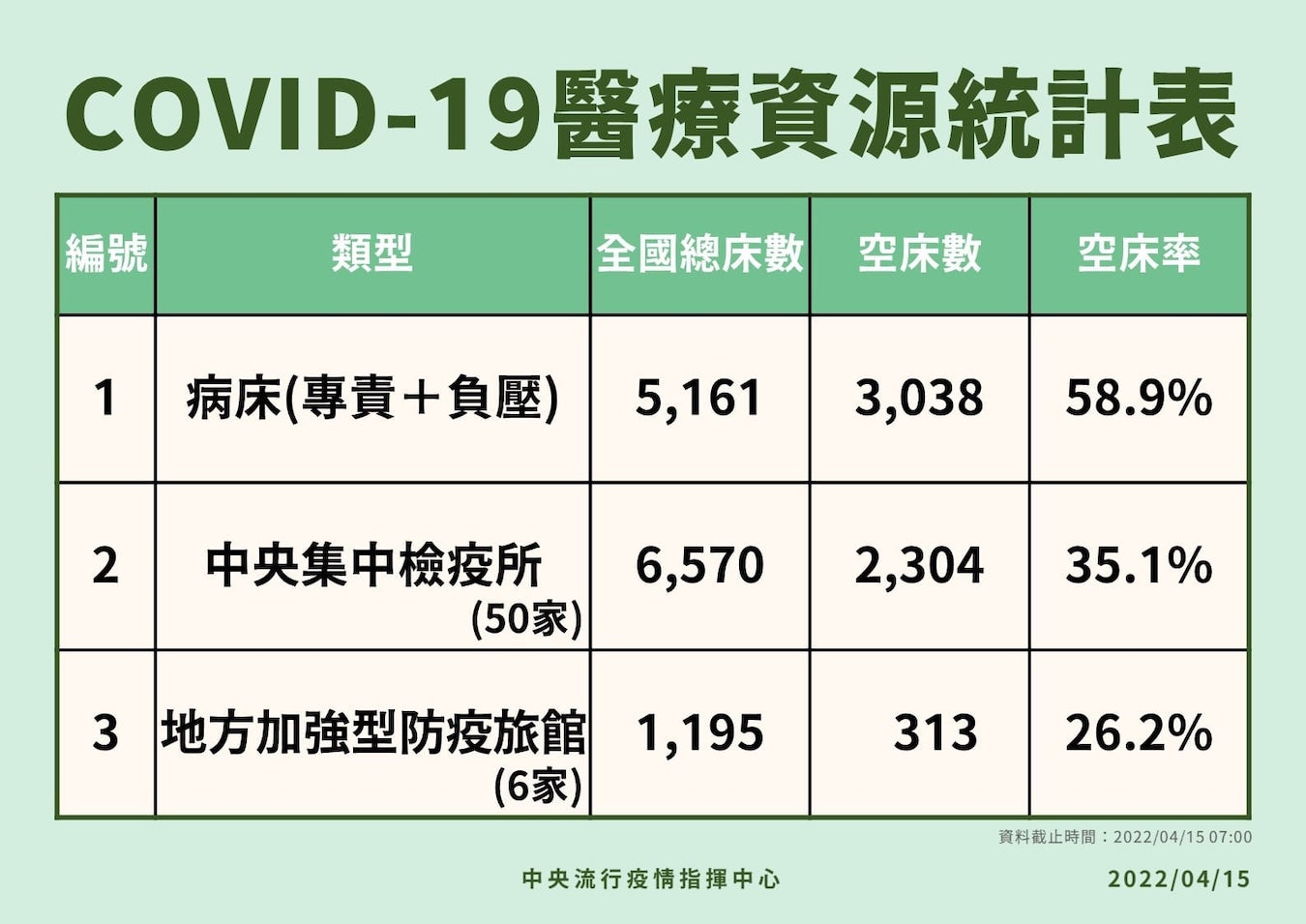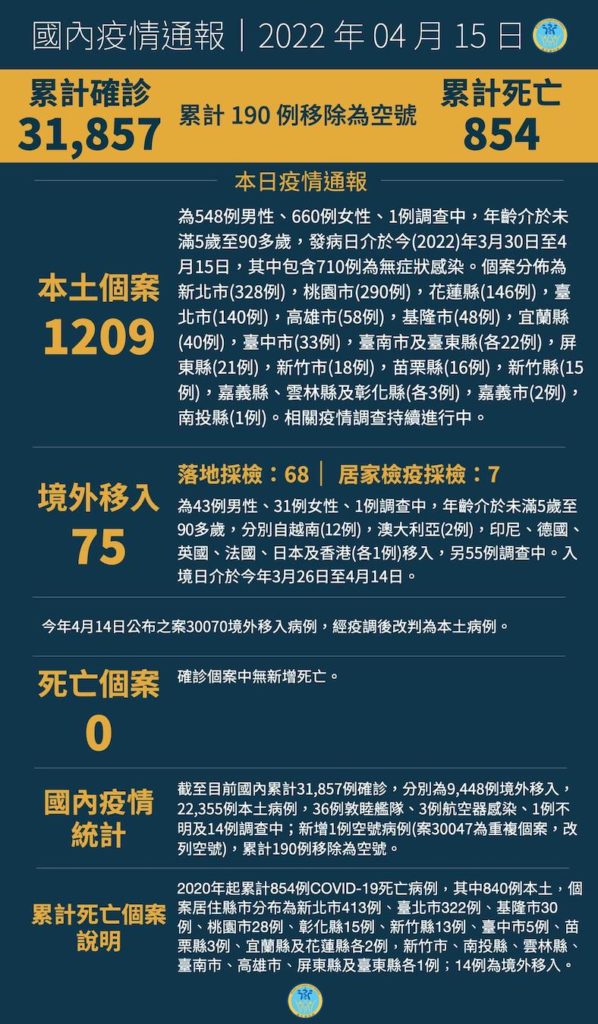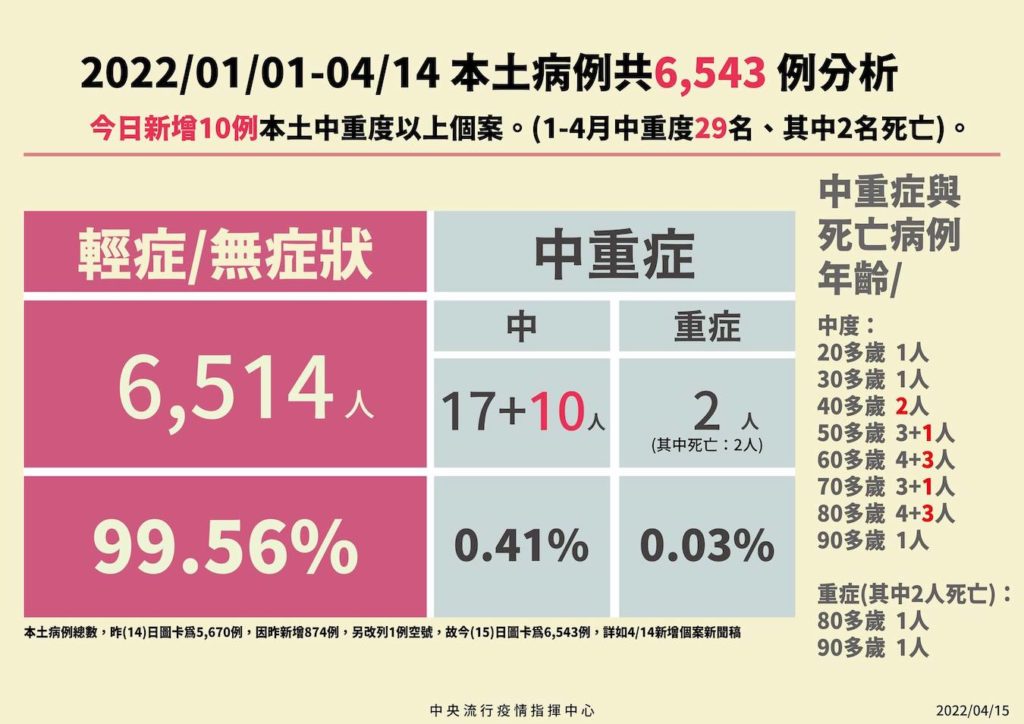by Brian Hioe
語言:
English
Photo Credit: 玄史生/WikiCommons/CC
TAIWAN REPORTED 1,209 domestic cases of COVID-19 today. Apart from being the highest number of cases reported to date, this is also the first time that Taiwan has broken 1,000 daily domestic cases. Otherwise, 75 imported cases were 68 of which were found while on arrival, while 7 were found while in quarantine. Zero deaths were reported.
Severe cases of COVID-19 continue to be low. Of 6,514 cases found this year, there were two severe cases, which later died. There have only been 27 cases of medium severity, with ten cases added today.
Hualien and Kaohsiung have been added to the list of high-risk areas for COVID-19, which was previously limited to greater Taipei, Keelung, and Taoyuan.
Information on today’s COVID-19 cases (left) and on the severity of cases (right). Photo credit: Ministry of Health and Welfare/Facebook
The Central Epidemic Command Center (CECC), which coordinates Taiwan’s COVID-19 response, reported today that the new cases added today included individuals that had not been fully vaccinated or booster, or individuals with pre-existing medical conditions. To this extent, the CECC emphasized booster requirements for participating in mass religious activities or other events that result in a large number of contacts. The CECC intends to increase booster requirements for participating in such activities going forward.
More broadly, the CECC’s current efforts focus on preventing severe cases of COVID-19, rather than retaining COVID-zero measures. At the same time, individuals in vulnerable demographics or with pre-existing medical conditions are particularly at risk.
As a result, the CECC announced that regulations for hospital admissions would be changed yesterday, so that individuals above 70 years old, above 36 weeks of pregnancy, or undergoing dialysis would be admitted to hospitals if they have COVID-19. not just in the event of medium or severe COVID-19. Cases with light or no symptoms are allowed to quarantine at home currently.
The CECC will be ending nasal swab testing for passengers arriving from Australia, Canada, New Zealand, and the US and instead switching to saliva tests. This is due to the fact that the rate of infection from these countries among arrivals is decreasing.
The CECC will also be compensating individuals for blood clots believed to have resulted from vaccination. One woman, in particular, will receive up to 2.5 million NT in compensation.
There have been concerns about COVID-19 cases among artists at an event in Taoyuan. Some artists deny having attended the event.
Price reductions will soon take place for domestically manufactured COVID-19 rapid tests. The lowest price for a single test will be 170 NT.
A number of the new cases reported today were among migrant workers in Taoyuan at a factory owned by Senao Networks. 111 migrant workers and three Taiwanese workers were among those found to have tested positive. This continues the longstanding pattern of clusters developing among migrant workers in electronics factories, due to crowded conditions in factories and dormitories.
The CECC has stressed that hospital capacity in Taiwan is still sufficient, however. In strengthened quarantine hotels, there are currently 1,195 rooms in six hotels, with 313 or 26.2% of all rooms empty. Where hospital beds are concerned, there are a total of 5,161 beds, with 3,038 beds empty, or 58.9% capacity available. This includes in specialized wards for COVID-19 as well as in negative pressure isolation wards. There are currently fifty centralized quarantine facilities, with a total capacity of 6,570. 2,304 beds are empty, or 35.1% of beds available.
 Information on the current number of available beds/rooms. Photo credit: Ministry of Health and Welfare/Facebook
Information on the current number of available beds/rooms. Photo credit: Ministry of Health and Welfare/Facebook
As can be seen from these statistics, the CECC is currently cautious in terms of conserving hospital capacity. If cases increase, the CECC may act to boost capacity for hospitals and quarantine facilities.
In an interview, Lee Ping-ing, the convenor of the Advisory Committee on Immunization Practices, stated that he expected cases to continue to be high over the next four to five months, seeing as Taiwan has decided to release COVID-19 measures in stages rather than all at once.
Indeed, when asked about the example of South Korea and its loosening of COVID measures today, Minister of Health and Welfare Chen Shih-chung stated that he believed that South Korea was taking the right approach in terms of shifting toward virus management strategies and trying to minimize the impact on everyday life, but that this was contingent on high rates of vaccination in South Korea.
As such, Chen indicated that the CECC will continue with efforts to boost vaccination among currently unvaccinated demographics. How this is to take place remains to be seen, however, with rates of vaccination high among young people, but having stalled among older demographics.



